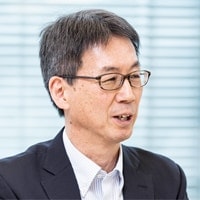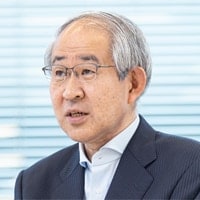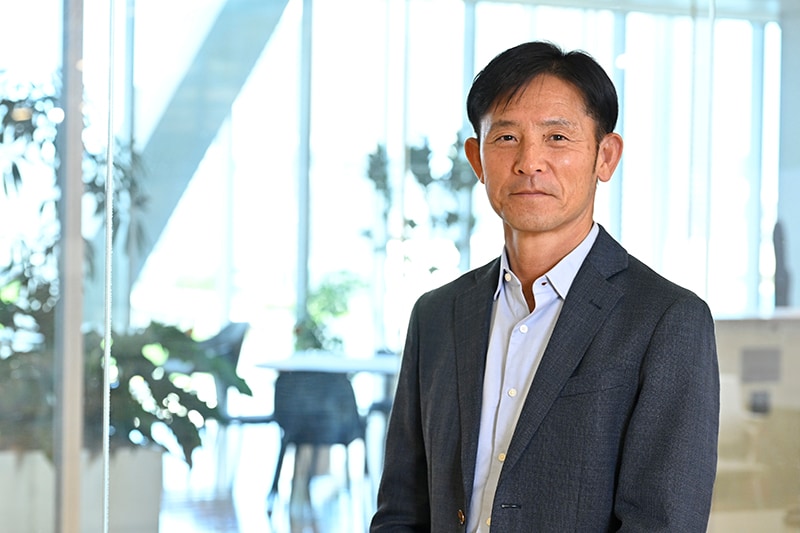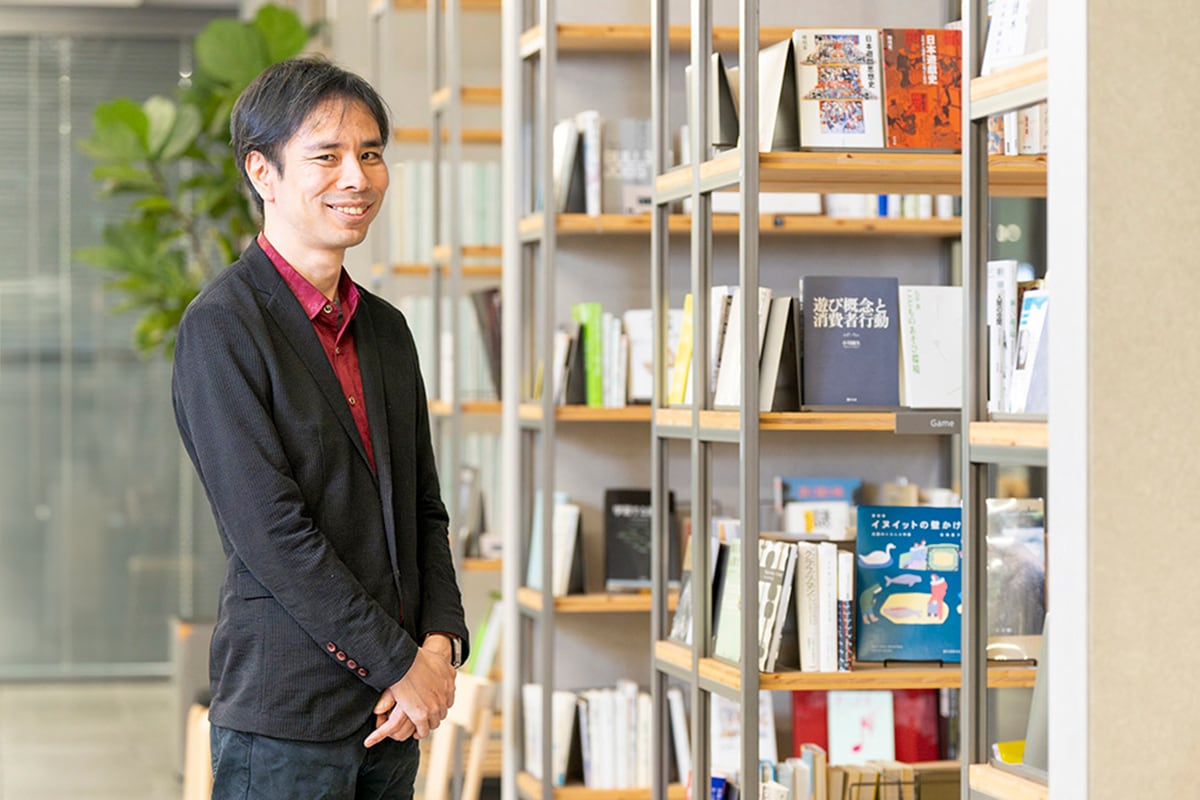People
Value Creation through Diverse Employees and Sony’s Unique Technology
May 25, 2020

In the “Corporate Report 2019,” which is Sony's first corporate report published last year, Kenichiro Yoshida, Sony’s President and CEO, states that Sony will “harness its diversity and realize the kinds of value creation that only Sony can deliver.”
What should Sony keep in mind, and what actions should it take in order to make this a reality? Toru Katsumoto, Sony’s Senior Executive Vice President and Officer in charge of R&D, and Kazushi Ambe, Sony’s Executive Vice President and Officer in charge of Human Resources, shared their thoughts regarding human resources development and diversity.
Profile
-

Toru Katsumoto
Senior Executive Vice President,
Officer in charge of R&D,
Officer in charge of Medical Business
Sony Corporation -

Kazushi Ambe
Executive Vice President,
Officer in charge of Human Resources and General Affairs
Sony Corporation
Sony's foundations for value creation are
the “Technology” to realize things that only Sony can,
and the “Employees” who create that technology
──In the “Corporate Report 2019,” “Technology” and “Employees” are identified as the most important aspects that form the foundation of Sony's value creation. What are the essential elements for realizing the kinds of value creation that only Sony can deliver?
Toru Katsumoto:Sony has many outstanding technologies, but excellence alone is not enough. How many differentiated technologies can we create? Based on our corporate direction of “getting closer to people,” it is vital that we understand the desires and challenges of creators and users, and then realize solutions to those needs though our differentiated technologies. To this end, the R&D Center has been collecting external feedback for about two years and focusing efforts on determining how our differentiated technology can be used to address the needs we discovered.
Kazushi Ambe:Yes, differentiated technologies are one of the most important elements for realizing the kind of value creation only Sony can deliver, and it is our talented employees who create those technologies. As such, the growth and development of our employees is essential for the growth of our technologies.
Throughout Sony’s history, the company has consistently maintained a relationship with its employees whereby each party is responsive to the needs of the other. There is a well-known instance where Akio Morita, one of Sony’s founders, said at a welcoming ceremony for new employees, “I sincerely welcome you to the company. Nevertheless, if you feel the company doesn't suit you, then quickly find another.” Sony’s corporate culture is defined by creating an environment where employees constantly evaluate whether Sony is a place where they can grow and take on new challenges, and the company is continually making sure it is appropriately meeting those needs.

Sony University
The Three Pillars for attracting and
developing motivated employees
──What can we do to strengthen our talent pool?
Ambe:I believe that our HR systems and policies are set in place not for managing employees, but for supporting them. Last year, in line with the definition of Sony’s Purpose, we organized our strategies into three “Pillars.” The first is “Attract” (talent acquisition). We are disseminating information in order to widely and accurately communicate the appeal of Sony to those who are interested in our company and identify with our Purpose. Next is “Develop” (learning and development). We constantly provide opportunities for employees to grow, such as the Sony University program and other training seminars. The last pillar is “Engage” (employee engagement). In order to maintain high motivation and enhance output, we are working on reforming corporate culture and creating a system to ensure that employee feedback is heard by management.
Katsumoto:To ensure that engineers, researchers, and the students currently studying in those fields fully understand Sony’s appeal as a company, we are strengthening internal and external communication of our various technologies across the Sony Group, for instance, holding a Technology Day and publishing special features on technology in Sony Group's magazine “Family.” I also believe it is important to deepen understanding among our employees of the various technologies being used across the Sony Group. Furthermore, we are actively disseminating information to overseas universities and at influential academic conferences, delivering our message to an extremely large audience.
Ambe:I’ve had opportunities to personally meet with students in India and China and explain Sony’s Purpose and our range of technologies, and as with students in Japan, they show a great level of interest in our activities. Competition for overseas recruitment is fierce, but I’m confident that if we accurately convey our message, we will be able to communicate the appeal of Sony as a workplace throughout the world.
Expanding “inner” diversity and engaging
in discussion to create breakthroughs
──Diversity is one of the most important values at Sony. What is the strength of diversity, and what is needed for Sony to take advantage of it?
Katsumoto:As I often discuss with Ambe-san, it is important not only to have people of different nationalities and genders, but also to have people with a variety of different ideas and ways of thinking. Last year, the R&D Center began rotation of department heads with the idea of enhancing the dynamism of our diversity. First, department heads from the U.S. and Germany exchanged positions with division heads in Japan, and from February this year, the head of the Belgium office started working in Japan. With laboratory heads from overseas bringing their diverse backgrounds and ideas to the table, I feel that the scope of our discussions has expanded much more than in recent years. It is also important to create an environment where everyone is on a level playing field. Our rule at the R&D center is that if there is even a single non-Japanese member at the meeting, then all communication must be in English. Monthly reports from General Managers and above and meeting minutes are also compiled in English so that all members of the R&D Center can access and reference these materials. Through this open information sharing approach, communication within each office has become much more efficient. This experience has really underlined the importance of fairness and timeliness when it comes to information sharing.

Ambe:That’s true. I believe that diversity is the starting point for innovation and new ideas. If each employee demonstrates their individuality, understands and respects the views of others, and discusses their opinions, it will naturally lead to new discoveries and ideas.
Katsumoto:Leaders also play a key role in leveraging diversity. When I was working in Europe, many of the project members came from different backgrounds, and their opinions frequently diverged. In situations like this, the tendency is to agree on a compromise somewhere in the middle in order to keep the peace. However, sometimes a leader needs the courage to choose an idea that is extreme but has the most competitive edge. I would have never learned this lesson if I hadn’t gone to Europe.
Ambe:Like Katsumoto-san, I learned a lot when working in completely different environments at joint venture companies and other industries in the U.K. and U.S. I want our employees to have a variety of experiences to broaden their horizons.
It is also important to understand the diversity of different generations. The thoughts and values of today’s so-called “Generation Z” students are quite different from our generation, and they can provide a major stimulus for our organization. We must make sure we fully engage members of these younger generations.
Think about how you can grow and contribute to society
──Finally, do you have a message for employees and future employees?
Ambe:I urge you to maintain your competitive spirit and to give constant thought to what you wish to achieve, and the kind of person you hope to become. Additionally, the ability to involve the people around you is becoming more important than ever. So, my hope is that you will continue to take on new challenges for value creation together with the people around you. Sony is a company where employees experience personal growth while positively impacting society through various challenges, and I strongly feel that it should continue to be such a place into the future. I hope that people who share this philosophy will join us at Sony.

Katsumoto:For Sony to become even stronger as company, it is important that we improve our technology while considering how best to get closer to people, solve issues, and contribute to society. Sony is a unique company with a wide range of businesses, including electronics, entertainment, and financial services, which are connected through a common foundation of "Technology” and “Employees.” Please look forward to how Sony will take on new challenges to create technology that will contribute to its diverse businesses and to society as a whole!




